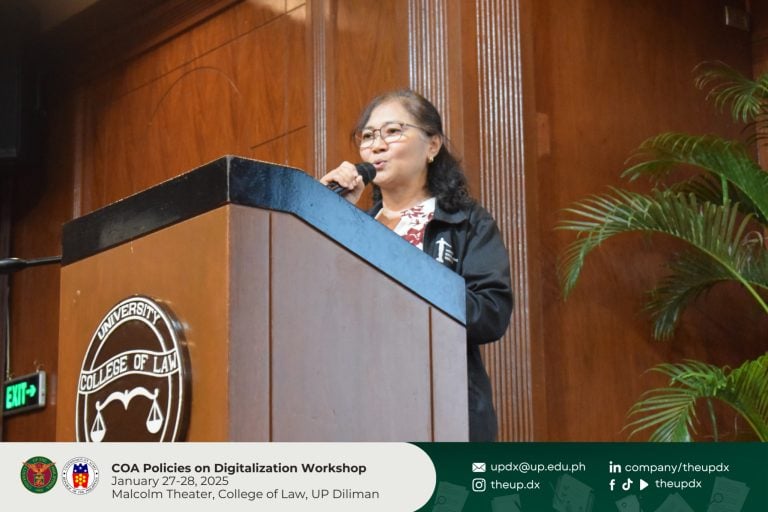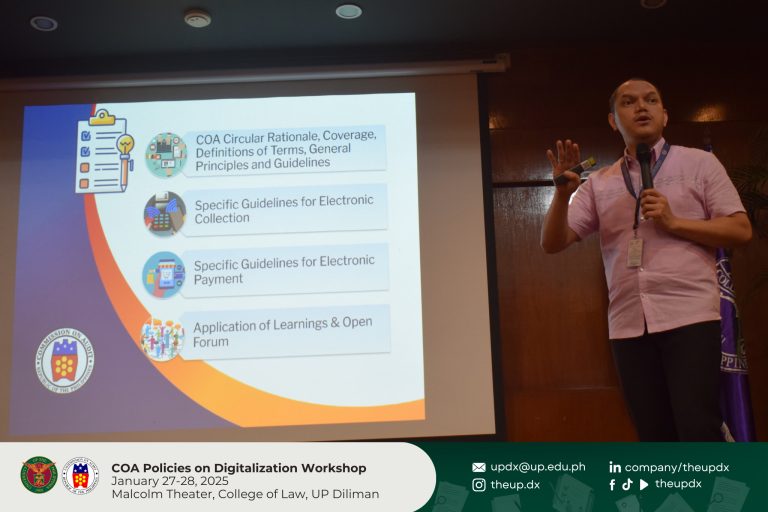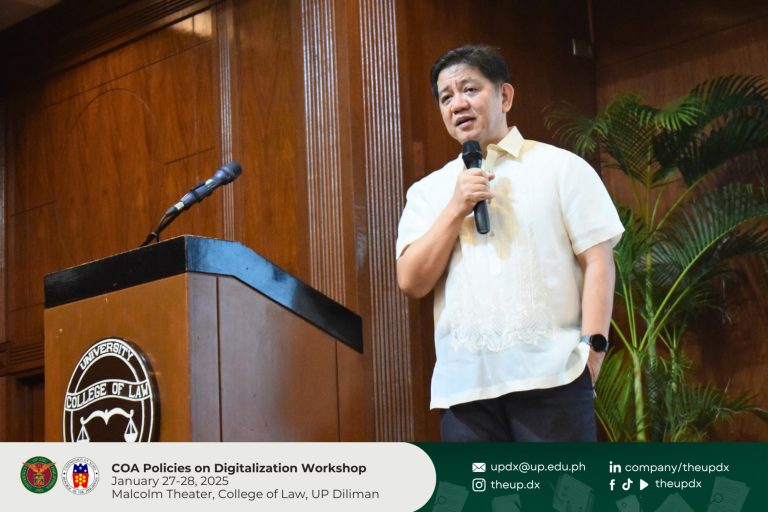A Digital Shift: UP Collaborates with COA to transition from Manual Transactions
25 February 2025 | Regine C. Pustadan
DILIMAN, Quezon City — The University of the Philippines (UP) has taken another essential stride toward digital transformation after hosting a workshop titled, COA Policies Supporting the Digitalization of UP Information Systems with the Commission on Audit (COA) last January 27-28, 2025 at the Malcolm Theater, UP Diliman.
Speaking on behalf of UP Vice President for Legal Affairs Atty. Abraham Rey Acosta, Assistant Vice President for Legal Affairs Atty. Eunice Briggita Suzanne J. Agsaoay-Saño emphasized that the goal is to transform UP into a fully paperless institution. “This is more than just a technological upgrade; it is a step toward fostering efficiency, accountability, and sustainability,” she explained.

In photo: AVP for Legal Affairs Atty. Eunice Agsaoay-Saño
Atty. Marlon Marquina, Director of the COA Information Technology Audit Office (COA-ITAO), served as the resource speaker for the workshop.
The hybrid event drew more than 430 participants from various UP constituent universities (CUs), including representatives from key university departments such as accounting, budgeting, cash, human resources, and supplies and property management. The workshop aimed to address concerns regarding the legality and validity of digital transactions in accordance with COA guidelines.
In his discussion, Atty. Marquina emphasized the inevitability of digital transactions in the coming years. “The future is digital, and technology is the tool that will get us there,” he said. He stressed the importance of establishing a secure and legally sound foundation to ensure that the transition to digital transactions is both seamless and compliant with legal requirements.

In photo: Atty. Marquina, Director of the COA Information Technology Audit Office (COA-ITAO)
“People will naturally fear the unknown,” Atty. Marquina mentioned before discussing three key COA policies critical to UP’s digitalization efforts. During the two-day workshop, participants were able to understand the Guidelines on the Use of Electronic Documents, Electronic Signatures, and Digital Signatures in Government Transactions (COA Circular No. 2021-006); the Guidelines on the Use of Electronic Collection (e-Collection) and Electronic Payment (e-Payment) for Government Transactions (COA Circular No. 2021-014); and the Guidelines for the Preservation of Electronic Vouchers, Supporting Documents, and Records Submitted to Audit Teams (COA Circular No. 2023-006).
These policies will serve as the University’s guiding framework in its efforts to minimize paper waste, improve efficiency, and standardize all transactional processes.
He also noted a crucial trade-off during the transition. “Security is inversely proportional to convenience,” he said. As UP moves toward fully digital transactions, ensuring the security and integrity of data and systems will be just as important as streamlining the user experience.
To gather contextualized insights, the workshop guided CU representatives in preparing and sharing their internal rules for adopting digital transactions. These presentations allowed participants to exchange best practices and discuss challenges specific to their institutions.
The University recognizes that this digital shift will require not only technological upgrades but also a cultural and operational transformation across all levels of the institution.
UP Vice President for Development Daniel C. Peckley, Jr. acknowledged the magnitude of the changes ahead, emphasizing the importance of staying committed to the University’s core values. “This shift is not just about updating systems,” he said. “It is about strengthening our commitment to excellence in service to the people.” He stressed that this digital transition is essential for UP to continue meeting the needs of its stakeholders efficiently while upholding its public service mission.

In photo: UP Vice President for Development
Daniel C. Peckley, Jr.
Dx Efforts in PH
According to a report from the United Nations Economic and Social Commission for Asia and the Pacific, the Philippines faces several challenges, including red tape, excessive paperwork, outdated systems, and slow, complicated transactions. The Anti-Red Tape Act of 2007 was enacted to eliminate regulations and processes that cause inefficiency and delays. In response, government agencies and NGAs are finding better ways to improve operations and efficiency.
At COA’s 2023 Strategic Planning Conference, Chairperson Gamaliel A. Cordoba announced plans for a seven-year digital transformation. As part of COA’s ten-point agenda, they will implement e-audit, digitizing government transactions, including collections, in collaboration with various agencies. They also plan to enhance audit methods by developing an automated system for e-collections and e-payments and using artificial intelligence to analyze big data for patterns and fraud detection.
These are but some of the efforts to reflect a broader push toward a more efficient, transparent, and technology-driven government. By embracing digital transformation, agencies continue aiming at reducing bureaucratic hurdles, improving public services, and strengthening accountability in the years ahead.
UP’s strides towards digitalization
The University’s digitalization initiatives have already gained momentum. In fact, last August 2024, UP’s Board of Regents (BOR) approved the Policy on Electronic Signatures and Transactions, laying the groundwork for a digital shift.
The BOR-approved policy validates the use of electronic signatures for official activities such as payments and budget requests. A procedural manual for implementation is currently in circulation for feedback of concerned Offices in the University.
UP has also been working closely with the Department of Information and Communications Technology (DICT) to integrate the Philippine National Public Key Infrastructure (PNPKI) for digital signatures. The PKI system is important to secure digital signatures as it ensures authenticity, integrity, and non-repudiation. By using trusted digital certificates, PKI verifies the signer’s identity and prevents tampering, making electronic transactions legally binding and secure.
Parallel to this policy, UP is gradually veering away from legacy systems with substantial costs and has started migrating to its homegrown systems. UP has rolled out Personnel Unified System Outlook (PUSO) and Budget Utilization and Liquidation System and Analytics (BULSA), two locally developed information systems for managing financial and human resources transactions since November 2024. These systems replaced previously used enterprise solutions, offering a more customized and efficient alternative tailored to the University’s needs. The leadership is now gearing towards unlocking the potential of its own IT and Dx talents.
Read more about PUSO and BULSA efforts here: https://uplb.edu.ph/all-news/puso-and-bulsa-orientation-goes-to-uplb/
This collaboration with COA on digitalization policies is just one part of a broader vision to build a smarter, more efficient, and more transparent academic institution. With digitalization becoming the foundation of UP’s operations, the University hopes to inspire others in the years to come.


